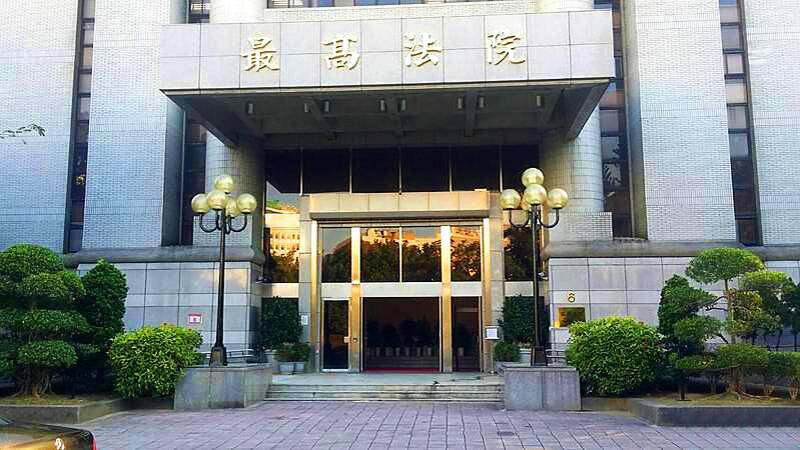The Supreme Court has upheld the reduced 18-year-and-10-month prison term given in a retrial in March to a man originally sentenced to life for the 2022 murder of a Malaysian student in Taipei.
In a news statement yesterday, the Supreme Court said the prosecutors’ argument for capital punishment was rejected because the murder resulted from a financial dispute, which is not the most serious situation as stipulated in the Constitutional Court’s 2024 decision regarding death penalty.
Yesterday’s Supreme Court decision is final.

Photo: Wu Cheng-feng, Taipei Times
Chen Po-yen (陳柏諺) was originally handed a life sentence by to a district court in January 2024 for the 2022 murder of Chai, a Malaysian woman in her early 20s studying at a university in Taipei.
Chen was convicted of strangling and suffocating Chai with a pillow at her place in Taipei over money disputes on Oct. 13, 2022, according to the court documents.
Chen appealed, requesting a reduced sentence on the grounds that he had handed himself in.
Following the murder, Chen fled the crime scene and returned home to attempt suicide, at which point he phoned his father and said he had killed someone.
Chen’s sister, who had overheard her father’s call, then phoned the police, telling them of her brother’s apparent confession. Police rang Chen, who told them that his conversation with his father was “just a joke.”
Because he had told the officers responding to the call who broke down the door of his apartment that he had killed someone, Chen argued that this constituted “handing himself in”
Prosecutors also appealed, asking for the death penalty because of the cruel nature of the murder, Chen’s lack of remorse, and his failure to secure forgiveness from the victim’s family.
In June 2024, the Taiwan High Court upheld the life sentence, rejecting the prosecutors’ appeal by citing shorter prison terms handed down in more brutal murderers.
Chen’s appeal was also rejected, with the High Court finding that he was “not forthcoming” in the process of what he claimed to be “turning himself in.”
In its ruling, the High Court noted that Chen first phoned his father after his suicide attempt but only admitted to killing Chai and provided the police with more details when first responders and police went to his place later in the day.
Both Chen and the prosecutors appealed the first High Court ruling, and the Supreme Court on Oct. 30, 2024, invalidated the High Court’s decision and ordered a retrial.
During the retrial, the High Court reexamined Chen’s claims about his intention to make amends by working to pay compensation to the victim’s family, the unusual way of turning himself in, and whether the killing was intentional in deliberating the sentence.
In its ruling announced on March 20, the High Court cited the Constitutional Court’s 2024 decision on death penalty, noting the case started with money disputes, not the most serious situation in a murder case, and added the possibility of Chen being rehabilitated, to explain cutting the prison term from life to 18 years and 10 months.

“China is preparing to invade Taiwan,” Deputy Minister of Foreign Affairs Francois Wu (吳志中) said in an exclusive interview with British media channel Sky News for a special report titled, “Is Taiwan ready for a Chinese invasion?” the Ministry of Foreign Affairs said today in a statement. The 25-minute-long special report by Helen Ann-Smith released yesterday saw Sky News travel to Penghu, Taoyuan and Taipei to discuss the possibility of a Chinese invasion and how Taiwan is preparing for an attack. The film observed emergency response drills, interviewed baseball fans at the Taipei Dome on their views of US President

The Central Weather Administration (CWA) today issued a "tsunami watch" alert after a magnitude 8.7 earthquake struck off the Kamchatka Peninsula in northeastern Russia earlier in the morning. The quake struck off the east coast of the Kamchatka Peninsula at 7:25am (Taiwan time) at a depth of about 19km, the CWA said, citing figures from the Pacific Tsunami Warning Center. The CWA's Seismological Center said preliminary assessments indicate that a tsunami could reach Taiwan's coastal areas by 1:18pm today. The CWA urged residents along the coast to stay alert and take necessary precautions as waves as high as 1m could hit the southeastern

The National Museum of Taiwan Literature is next month to hold an exhibition in Osaka, Japan, showcasing the rich and unique history of Taiwanese folklore and literature. The exhibition, which is to run from Aug. 10 to Aug. 20 at the city’s Central Public Hall, is part of the “We Taiwan” at Expo 2025 series, highlighting Taiwan’s cultural ties with the international community, National Museum of Taiwan Literature director Chen Ying-fang (陳瑩芳) said. Folklore and literature, among Taiwan’s richest cultural heritages, naturally deserve a central place in the global dialogue, Chen said. Taiwan’s folklore would be immediately apparent at the entrance of the

ECONOMIC BENEFITS: The imports from Belize would replace those from Honduras, whose shrimp exports have dropped 67 percent since cutting ties in 2023 Maintaining ties with Taiwan has economic benefits, Ministry of Foreign Affairs officials said yesterday, citing the approval of frozen whiteleg shrimp imports from Belize by the Food and Drug Administration (FDA) as an example. The FDA on Wednesday approved the tariff-free imports from Belize after the whiteleg shrimp passed the Systematic Inspection of Imported Food, which would continue to boost mutual trade, the ministry said. Taiwan’s annual consumption of whiteleg shrimps stands at 30,000 tonnes, far exceeding domestic production, the ministry said. Taiwan used to fill the gap by importing shrimps from Honduras, but purchases slumped after Tegucigalpa severed diplomatic ties with Taiwan